Conditional Operator in C ( ?: ) with Example
The conditional operator in C is similar to the if-else statement. The if-else statement takes more than one line of the statements, but the conditional operator finishes the same task in a single statement. The conditional operator in C is also called the ternary operator because it operates on three operands.

What is a Conditional Operator in C
The conditional operator is also known as a ternary operator. The conditional statements are the decision-making statements that depend upon the output of the expression. As a conditional operator works on three operands, so it is also known as the ternary operator.
The operands may be an expression, constants, or variables. It starts with a condition, hence it is called a conditional operator. Conditional operators return one value if the condition is true and returns another value if the condition is false.
Syntax of Conditional Operator in C
or for simplicity, we write it as
The expression1 is evaluated, it is treated as a logical condition . If the result is non-zero then expression2 will be evaluated otherwise expression3 will be evaluated. The value after evaluation of expression2 or expression3 is the final result.
The conditional operator in C works similarly to the conditional control statement if-else. Hence every code written using a conditional operator can also be written using if-else. When compared with if-else, conditional operator performance is high.
Conditional Operator Example
Write a C program to find the maximum in the given two numbers using the conditional operator.
Enter two numbers: 12.5 10.5 Maximum of 12.50 and 10.50 = 12.50
First the expression, (num1 > num2) is evaluated. Here num1=12.5 and num2=10.5; so expression (num1>num2) becomes true. Hence num1 is the maximum number, and it is assigned to the variable max.
Output for another test:-
Enter two numbers: 9 20 Maximum of 9.00 and 20.00 = 20.00
Here num1=9 and num2=20; so the expression (num1>num2) becomes false. Hence num2 is the maximum number and it is assigned to the variable max.
The parentheses in the conditional operator are not necessary around the first expression of a conditional expression. The precedence of conditional operator ?: is very low. But it is advisable to use parentheses, however, it makes the condition part of the expression easier to see.
The above program using a conditional operator is similar to the below program using the if-else conditional statement.
We will see more examples Later, first, let us see some popular MCQ based on the conditional operator in C language.
More Example of Conditional Operator in C
1) Program description:- Find the number is positive or negative using the conditional operator.
Output for the different test-cases:-
Enter a number: 8 Positive.
Enter a number: -10 Negative
2) Program description:- Find the given number is odd or even using the conditional operator in C.
Enter a number: 9 Odd
Enter a number: 8 Even
3) Program description:- Program to Find the minimum of two numbers using the conditional operator.
Enter two numbers: 10 8 Minimum = 8.00
Enter two numbers: 15 12 Minimum = 12.00
4) Program description:- Write a program to enter two numbers. Make a comparison between them with the conditional operator. If the first number is greater than the second, perform a division operation otherwise multiplication operation.
Enter two number: 10 20 Result: 200.00
Enter two number: 10 5 Result: 2.00
5) Another good example of the conditional operator is,
Enter the number of items: 1 You have 1 item.
Enter the number of items: 2 You have 2 items.
More than One Conditional Operator in a Statement
We can use more than one conditional operator in a statement. But in this case, it makes harder to understand the code. Use the ternary operator only when the resulting statement is short. This will make your code concise and much more readable.
Ternary operators can be used to replace multiple lines of code to a single line of code.
The above multiple lines of code can be replaced with,
Conditional Operator in C for Three Variables
Program Description:- Find the largest among three numbers using the conditional operator .
Program to find the maximum of three numbers using conditional operators.
Enter three numbers: 10 30 12 Maximum number = 30.00
Find the output of the below code?
The output of the above program: 420
The output of the above program: 5
Choose a C conditional Operator from the list
MCQ1) Choose a C conditional operator from the list?
A) ? : B) : ? C) : < D) < :
Answer:- A) ? :
We have already seen the syntax of the conditional operator. The syntax for the conditional operator is:- expression1 ? expression2 : expression3;
Choose a Syntax for C Ternary Operator from the List
MCQ2) Choose a syntax for C ternary operator from the list?
A) condition ? expression1 : expression2 B) condition : expression1 ? expression2 C) condition ? expression1 < expression2 D) condition < expression1 ? expression2
Answer:- A) condition ? expression1 : expression2
If the condition is true, expression 1 is evaluated. If the condition is false, expression 2 is evaluated. The conditional operator is also called a ternary operator.
Q1) What is a conditional operator in C with example?
The conditional operator in C is a conditional statement that returns the first value if the condition is true and returns another value if the condition is false. It is similar to the if-else statement. The if-else statement takes more than one line of the statements, but the conditional operator finishes the same task in a single statement.
Q2) What is conditional operator write syntax?
The syntax for the conditional operator in C is:- expression1? expression2: expression3; Here the expression1 is evaluated and treated as a logical condition. If the result is non-zero then expression2 will be evaluated otherwise expression3 will be evaluated. The value after evaluation of expression2 or expression3 is the final result. Or for simplicity, we can also write it like- condition? true-statement : false-statement;
Q3) What is a conditional operator used in C?
The conditional operator is used to check whether the given condition is true or false. If the condition is true then perform this task else perform another task. For example- expression1? expression2: expression3; Here the expression1 is evaluated, it is treated as a logical condition. If the result is non-zero then expression2 will be evaluated otherwise expression3 will be evaluated.
Q4) What is the function of the conditional operator?
Conditional operators are used to evaluating a condition that’s applied to one or two boolean expressions. The result of the evaluation is either true or false.
Q5) What is the symbol used for the conditional operator? The symbol used for the conditional operator in C is ?:
Q6) How many arguments the conditional operator takes?
The ternary operator takes three arguments : The first is a comparison argument. The second argument is the result of a true comparison, and the third argument is the result of a false comparison.
Q7) What is the other name for the conditional operator? The other name for the conditional operator is the ternary operator.
Q8) Why conditional operator is called the ternary operator?
Since the conditional operator in C works on three operands therefore it is also called a ternary operator. The operands may be an expression, constants, or variables.
If you enjoyed this post, share it with your friends. Do you want to share more information about the topic discussed above or do you find anything incorrect? Let us know in the comments. Thank you!
Follow Us Instagram • Twitter • Youtube • Linkedin • Facebook • Pinterest • Telegram
Leave a Comment Cancel Reply
Your email address will not be published. Required fields are marked *
Learn C practically and Get Certified .
Popular Tutorials
Popular examples, reference materials, learn c interactively, c introduction.
- Getting Started with C
- Your First C Program
C Fundamentals
- C Variables, Constants and Literals
- C Data Types
- C Input Output (I/O)
C Programming Operators
C Flow Control
C if...else Statement
- C while and do...while Loop
- C break and continue
C switch Statement
- C goto Statement
- C Functions
- C User-defined functions
- Types of User-defined Functions in C Programming
- C Recursion
- C Storage Class
C Programming Arrays
- C Multidimensional Arrays
- Pass arrays to a function in C
C Programming Pointers
- Relationship Between Arrays and Pointers
- C Pass Addresses and Pointers
- C Dynamic Memory Allocation
- C Array and Pointer Examples
- C Programming Strings
- String Manipulations In C Programming Using Library Functions
- String Examples in C Programming
C Structure and Union
- C structs and Pointers
- C Structure and Function
C Programming Files
- C File Handling
- C Files Examples
C Additional Topics
- C Keywords and Identifiers
- C Precedence And Associativity Of Operators
- C Bitwise Operators
- C Preprocessor and Macros
- C Standard Library Functions
C Tutorials
- Check Whether a Number is Even or Odd
- Make a Simple Calculator Using switch...case
- Find LCM of two Numbers
C Ternary Operator
We use the ternary operator in C to run one code when the condition is true and another code when the condition is false . For example,
Here, when the age is greater than or equal to 18 , Can Vote is printed. Otherwise, Cannot Vote is printed.
Syntax of Ternary Operator
The syntax of ternary operator is:
The testCondition is a boolean expression that results in either true or false . If the condition is
- true - expression1 (before the colon) is executed
- false - expression2 (after the colon) is executed
The ternary operator takes 3 operands (condition, expression1 and expression2) . Hence, the name ternary operator .
Example: C Ternary Operator
In the above example, we have used a ternary operator that checks whether a user can vote or not based on the input value. Here,
- age >= 18 - test condition that checks if input value is greater or equal to 18
- printf("You can vote") - expression1 that is executed if condition is true
- printf("You cannot vote") - expression2 that is executed if condition is false
Here, the user inputs 12 , so the condition becomes false . Hence, we get You cannot vote as output.
This time the input value is 24 which is greater than 18 . Hence, we get You can vote as output.
Assign the ternary operator to a variable
In C programming, we can also assign the expression of the ternary operator to a variable. For example,
Here, if the test condition is true , expression1 will be assigned to the variable. Otherwise, expression2 will be assigned.
Let's see an example.
In the above example, the test condition (operator == '+') will always be true . So, the first expression before the colon i.e the summation of two integers num1 and num2 is assigned to the result variable.
And, finally the result variable is printed as an output giving out the summation of 8 and 7 . i.e 15 .
Ternary Operator Vs. if...else Statement in C
In some of the cases, we can replace the if...else statement with a ternary operator. This will make our code cleaner and shorter.
Let's see an example:
We can replace this code with the following code using the ternary operator.
Here, both the programs are doing the same task, checking even/odd numbers. However, the code using the ternary operator looks clean and concise.
In such cases, where there is only one statement inside the if...else block, we can replace it with a ternary operator .
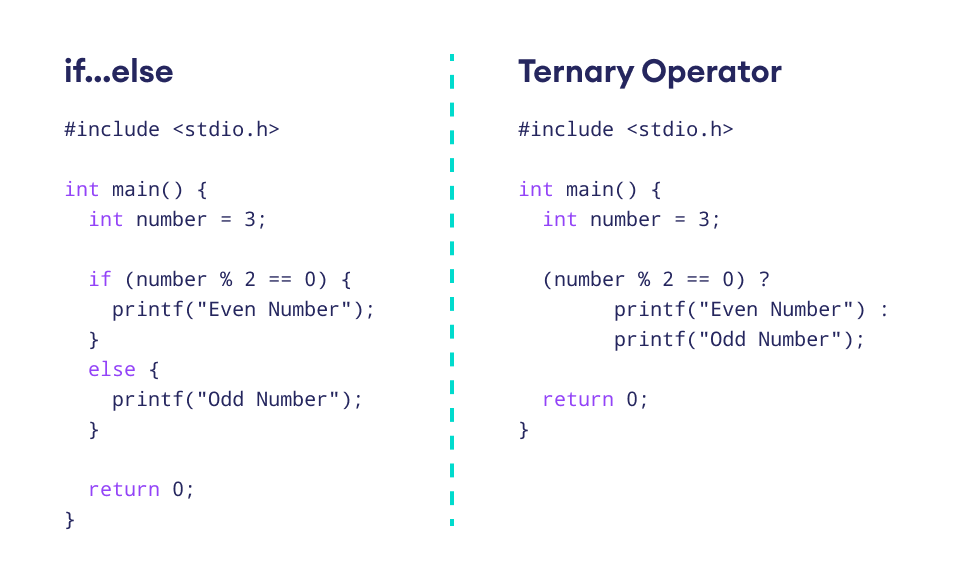
Table of Contents
- Introduction
- Ternary Operator
- Example: Ternary Operator
- Ternary Operator with Variable
- Ternary Operator Vs. if...else
Before we wrap up, let’s put your knowledge of C ternary operator to the test! Can you solve the following challenge?
Write a function to check if a person is eligible to vote.
- Assume the voting age to be 18 .
- Return "Yes" if the person is eligible to vote, otherwise, return "No" .
- For example, with input age = 20 , the return value should be "Yes" .
Sorry about that.
Our premium learning platform, created with over a decade of experience and thousands of feedbacks .
Learn and improve your coding skills like never before.
- Interactive Courses
- Certificates
- 2000+ Challenges
Related Tutorials
Next: Comma Operator , Previous: Logicals and Assignments , Up: Execution Control Expressions [ Contents ][ Index ]
8.4 Conditional Expression
C has a conditional expression that selects one of two expressions to compute and get the value from. It looks like this:
Conditional Operator in C

The conditional operator in C, often referred to as the ternary operator, offers a streamlined way to execute if-else statements in just one line. This powerful tool allows programmers to evaluate a condition and choose between two paths: one if the condition is true, and another if it's false. Its simplicity and efficiency make it a favorite for optimizing code readability and functionality.
Syntax of Conditional Operator in C
One common way to employ the conditional operator is as follows:
This structure is straightforward, where variable is assigned valueIfTrue if the condition evaluates to true, and valueIfFalse otherwise.
Alternatively, the syntax can be elaborated to explicitly encompass the condition within parentheses:
Additionally, there exists a variation that emphasizes the assignment within the branches of the conditional operator:
Each of these forms of the conditional operator syntax in C allows programmers to write more concise and readable code.
Working of Conditional Operator in C
Working of all versions of Conditional Operator are similar and here's how it operates:
- The initial step involves evaluating a specific condition, denoted as Condition .
- If Condition evaluates to true, the operation proceeds with Expression2 . This part of the code is executed, leading to the execution of actions or the return of values specific to the true condition.
- Conversely, if Condition is found to be false, Expression3 is the path taken. In this scenario, the code block or value corresponding to the false condition is executed or returned.
- The final step culminates in the return of the result from the executed expression, effectively completing the conditional operation.
Flow Chart of Conditional Operators in C

Examples of Conditional Operators in C
Here are examples demonstrating the use of the conditional operator in C to achieve different functionalities.
Example 1: Program to Store the Greatest of Two Numbers
Explanation: This program prompts the user to input two numbers. It then uses the conditional operator to compare these numbers and assigns the greater number to the variable greatest , which is then printed.
Example 2: Program to Check Whether a Year is a Leap Year
Explanation: This code checks if the entered year is a leap year. It uses the conditional operator to evaluate whether the year is divisible by 4 and not by 100, or it is divisible by 400. Based on this condition, it prints whether the year is a leap year or not.
Example 3: Program to find given Number is Odd or Even
Explanation: In this example, the user is prompted to enter a number. The program then uses the conditional operator to determine whether the number is even or odd by checking the remainder of the division of the number by 2. Depending on the result, it prints out the appropriate message.
Associativity of the Conditional Operator in C
The Associativity property defines the order in which the operands of the operator gets executed. When an expression has more than one operator in it, and more than one operators have the same precedence, then the order in which the operator gets executed is based on the associativity. The Associativity of the conditional operator is from Right to Left .
Difference Between Conditional Operator in C and if-else statement in C
The conditional operator can be used in the case of an if-else statement if the if-else statement only has one statement to execute. The conditional operator reduces the number of lines of code in a program.
Some noteworthy differences between the conditional operator and the if-else statement of the C programming language are listed in the below tabular column:
Q. Is the conditional operator in C and the ternary operator of the C programming language the same?
A. yes, the conditional operator are also known as the ternary operator.
Q. Why is it called a ternary operator?
A. The conditional operator is called a ternary operator because it is the only operator in C that takes three operands. The term "ternary" comes from Latin, meaning "composed of three items".
Q. Why is it called a conditional operator in C?
A. The first operand for the conditional operator is always a condition, so it is called the conditional operator.
Q. Can I use conditional operator in C instead of if statement?
A. It cannot entirely replace if statements, especially in scenarios involving more complex logic or the need to execute multiple statements conditionally without explicitly returning or assigning a value.
- The conditional operator, or ternary operator, in C is a succinct alternative to if-else statements, enabling conditional logic in a single line for enhanced code readability and efficiency.
- Its syntax varies from a simple variable = condition ? valueIfTrue : valueIfFalse; to more explicit forms incorporating parentheses for clarity or emphasizing assignment within its branches.
- The operator works by evaluating a condition, then executing one of two expressions based on the condition's truthiness, culminating in the return of the resultant value.
- Examples in the article illustrate its use in practical scenarios, such as determining the greater of two numbers, checking for a leap year, and assessing if a number is odd or even.

- C Programming Tutorial
- Basics of C
- C - Overview
- C - Features
- C - History
- C - Environment Setup
- C - Program Structure
- C - Hello World
- C - Compilation Process
- C - Comments
- C - Keywords
- C - Identifiers
- C - User Input
- C - Basic Syntax
- C - Data Types
- C - Variables
- C - Integer Promotions
- C - Type Conversion
- C - Type Casting
- C - Booleans
- Constants and Literals in C
- C - Constants
- C - Literals
- C - Escape sequences
- C - Format Specifiers
- Operators in C
- C - Operators
- C - Arithmetic Operators
- C - Relational Operators
- C - Logical Operators
- C - Bitwise Operators
- C - Assignment Operators
- C - Unary Operators
- C - Increment and Decrement Operators
- C - Ternary Operator
- C - sizeof Operator
- C - Operator Precedence
- C - Misc Operators
- Decision Making in C
- C - Decision Making
- C - if statement
- C - if...else statement
- C - nested if statements
- C - switch statement
- C - nested switch statements
- C - While loop
- C - For loop
- C - Do...while loop
- C - Nested loop
- C - Infinite loop
- C - Break Statement
- C - Continue Statement
- C - goto Statement
- Functions in C
- C - Functions
- C - Main Function
- C - Function call by Value
- C - Function call by reference
- C - Nested Functions
- C - Variadic Functions
- C - User-Defined Functions
- C - Callback Function
- C - Return Statement
- C - Recursion
- Scope Rules in C
- C - Scope Rules
- C - Static Variables
- C - Global Variables
- Arrays in C
- C - Properties of Array
- C - Multi-Dimensional Arrays
- C - Passing Arrays to Function
- C - Return Array from Function
- C - Variable Length Arrays
- Pointers in C
- C - Pointers
- C - Pointers and Arrays
- C - Applications of Pointers
- C - Pointer Arithmetics
- C - Array of Pointers
- C - Pointer to Pointer
- C - Passing Pointers to Functions
- C - Return Pointer from Functions
- C - Function Pointers
- C - Pointer to an Array
- C - Pointers to Structures
- C - Chain of Pointers
- C - Pointer vs Array
- C - Character Pointers and Functions
- C - NULL Pointer
- C - void Pointer
- C - Dangling Pointers
- C - Dereference Pointer
- C - Near, Far and Huge Pointers
- C - Initialization of Pointer Arrays
- C - Pointers vs. Multi-dimensional Arrays
- Strings in C
- C - Strings
- C - Array of Strings
- C - Special Characters
- C Structures and Unions
- C - Structures
- C - Structures and Functions
- C - Arrays of Structures
- C - Self-Referential Structures
- C - Lookup Tables
- C - Dot (.) Operator
- C - Enumeration (or enum)
- C - Structure Padding and Packing
- C - Nested Structures
- C - Anonymous Structure and Union
- C - Bit Fields
- C - Typedef
- File Handling in C
- C - Input & Output
- C - File I/O (File Handling)
- C Preprocessors
- C - Preprocessors
- C - Pragmas
- C - Preprocessor Operators
- C - Header Files
- Memory Management in C
- C - Memory Management
- C - Memory Address
- C - Storage Classes
- Miscellaneous Topics
- C - Error Handling
- C - Variable Arguments
- C - Command Execution
- C - Math Functions
- C - Static Keyword
- C - Random Number Generation
- C - Command Line Arguments
- C Programming Resources
- C - Questions & Answers
- C - Quick Guide
- C - Cheat Sheet
- C - Useful Resources
- C - Discussion
- Selected Reading
- UPSC IAS Exams Notes
- Developer's Best Practices
- Questions and Answers
- Effective Resume Writing
- HR Interview Questions
- Computer Glossary
Assignment Operators in C
In C language, the assignment operator stores a certain value in an already declared variable. A variable in C can be assigned the value in the form of a literal, another variable, or an expression.
The value to be assigned forms the right-hand operand, whereas the variable to be assigned should be the operand to the left of the " = " symbol, which is defined as a simple assignment operator in C.
In addition, C has several augmented assignment operators.
The following table lists the assignment operators supported by the C language −
Simple Assignment Operator (=)
The = operator is one of the most frequently used operators in C. As per the ANSI C standard, all the variables must be declared in the beginning. Variable declaration after the first processing statement is not allowed.
You can declare a variable to be assigned a value later in the code, or you can initialize it at the time of declaration.
You can use a literal, another variable, or an expression in the assignment statement.
Once a variable of a certain type is declared, it cannot be assigned a value of any other type. In such a case the C compiler reports a type mismatch error.
In C, the expressions that refer to a memory location are called "lvalue" expressions. A lvalue may appear as either the left-hand or right-hand side of an assignment.
On the other hand, the term rvalue refers to a data value that is stored at some address in memory. A rvalue is an expression that cannot have a value assigned to it which means an rvalue may appear on the right-hand side but not on the left-hand side of an assignment.
Variables are lvalues and so they may appear on the left-hand side of an assignment. Numeric literals are rvalues and so they may not be assigned and cannot appear on the left-hand side. Take a look at the following valid and invalid statements −
Augmented Assignment Operators
In addition to the = operator, C allows you to combine arithmetic and bitwise operators with the = symbol to form augmented or compound assignment operator. The augmented operators offer a convenient shortcut for combining arithmetic or bitwise operation with assignment.
For example, the expression "a += b" has the same effect of performing "a + b" first and then assigning the result back to the variable "a".
Run the code and check its output −
Similarly, the expression "a <<= b" has the same effect of performing "a << b" first and then assigning the result back to the variable "a".
Here is a C program that demonstrates the use of assignment operators in C −
When you compile and execute the above program, it will produce the following result −
Start Learning
Data Science
Future Tech
Accelerator Program in
Business Analytics and Data Science
In collaboration with
Certificate Program in
Financial Analysis, Valuation, & Risk Management
DevOps & Cloud Engineering
Strategic Management and Business Essentials
Join Our 4-Week Free Gen AI Course with select Programs.
Request a callback
or Chat with us on
Conditional Statements in C: Types and Examples

Have you ever wondered how computers come to the decision of which actions to perform? A program selects what action to perform based on the information it receives; that is where conditional statements in C come into play.
When we are coding, often the program needs to choose between any number of possible actions depending upon the input given by the user or, perhaps checking some condition. These types of decisions within C programming are handled using conditional statements. The ability to “decide” makes our programs dynamic and flexible. Without conditional statements, our programs would be stiff, and unable to take into account changing scenarios.
Consider if we were developing a program that must determine whether someone was old enough to vote or not. Of course, ideally, we would need some way to check their age, but that’s a fairly simplistic example of what conditional statements can do for you. They guide the flow of the program based on conditions you may have defined.
In this blog, we’ll dig deep into how these statements work, look at some of the types of them, and see them in action with some examples. Whether you are a newcomer to C or just want to refresh your knowledge, it’s about time you are here.
What are Conditional Statements in C?
Conditional statements in C are used to perform different actions depending on whether a condition evaluates to true or false. Conditions are mainly comparisons or expressions that evaluate a Boolean result, that is, a true or false value. If this condition evaluates to true, the program runs a particular block of code. If it is false, it either skips that block or runs an alternate block.
Without conditional statements, every line of code would have been executed in sequence, limited only to the ability of the program to react appropriately to changing inputs or scenarios. In other words, conditional statements in C make your program flexible, responsive, and able to handle different situations as the traffic light system guides cars through intersections on the basis of various signals.
Why Conditional Statements Are Vital for Program Flow Control
Imagine you were in a car and reached a traffic signal; you either stop or go, depending on whether the light is red or green. Conditional statements in programming serve like traffic signals for your code-they help with the flow of control, and a program can then decide which way to go based on certain conditions.
Without conditional statements, our programs would simply run through in a straight line from start to finish and wouldn’t even be able to react if there were changes made to input or environment. Conditional statements allow us to:
- Do different things based on different user input.
- Execute different blocks of code based on calculated results.
- Control whether certain parts of the code even run at all.
In other words, without conditional statements, we won’t be able to handle scenarios well in real life. They are the foundation of decision-making in C programming.
Also Read: Control Statements in C
The Different Types of Conditional Statements in C Programming
There is not one general conditional statement. The beauty of C is that it gives us several different tools for different situations, and the art is in knowing which to use. Let’s cover them one at a time.
1. if Statement in C
The if statement is the simplest form of conditional statement in C. It allows us to run a block of code only if a specific condition is true.
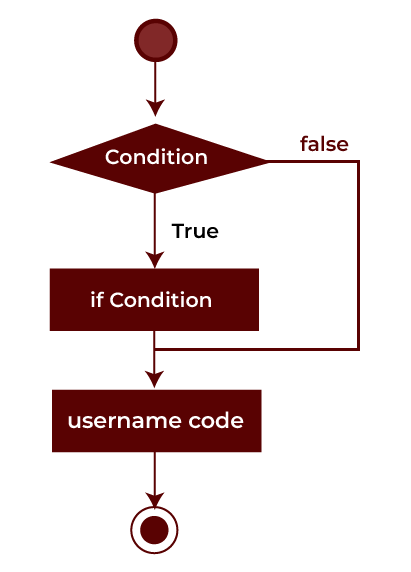
- The condition is an expression that evaluates to true or false.
- If it evaluates to true, the code within braces {} is executed.
- If the condition is false, the block is skipped entirely.
2. if-else Statement in C
The if-else statement is an extension of the if statement. It helps us execute one block of code if the condition meets the true state, and the other block if the condition meets a false state.
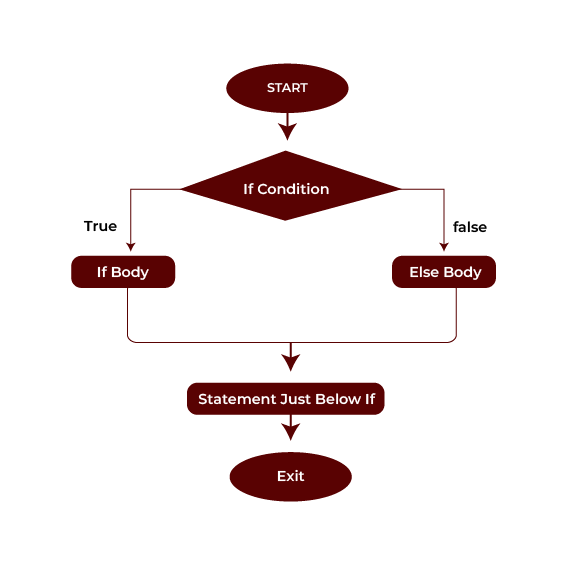
- If the condition is true, the first block runs.
- If the condition is false, the second block inside the else statement runs.
Also Read: Branching Statements in C
3. Nested if-else Statement
The nested if-else statement is used when we need to check many conditions. Such a situation helps us place one if or else statement inside another, creating a hierarchy of decisions.
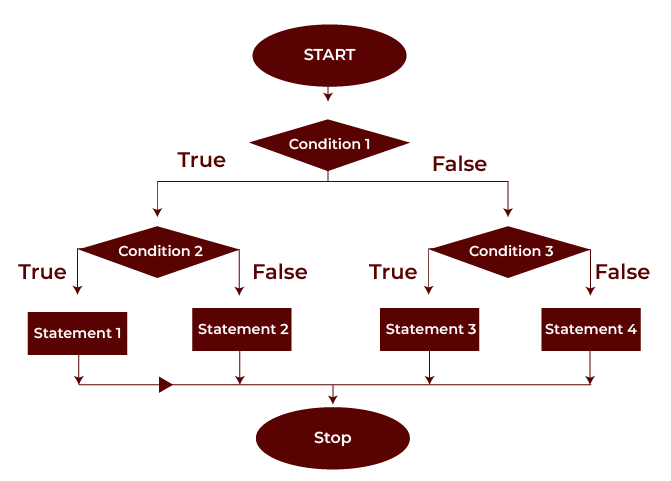
- Each if can contain another if-else structure, allowing us to check conditions in a nested manner.
- This structure helps handle more complex logic where multiple conditions must be evaluated in a specific order.
4. else-if Ladder for Multiple Conditions
We can use the else-if ladder when we wish to check several conditions in sequence. It allows linking several if and else-if statements together, and only one of the blocks will be executed.
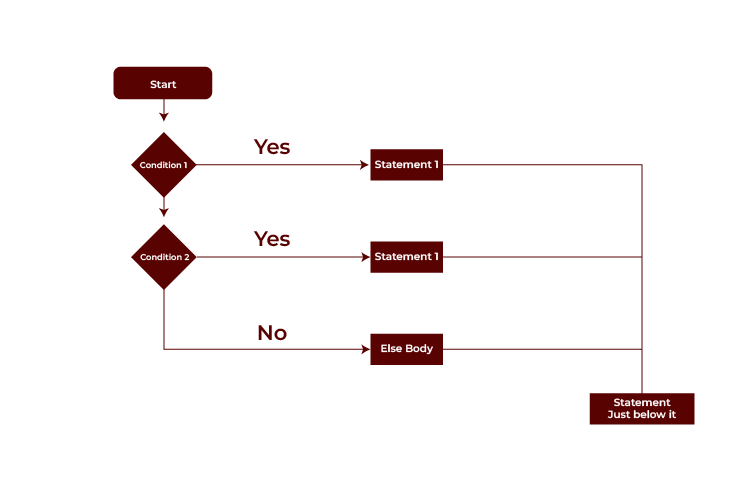
- The program evaluates the conditions one by one.
- As soon as one condition is true, its corresponding block runs and the rest of the ladder is skipped.
5. Switch Statement: Simplifying Multiple Conditions
The switch statement is cleaner than handling lots of conditions based on the value of just a single variable. It helps clean up our code when we have a large number of if-else conditions comparing the same variable.
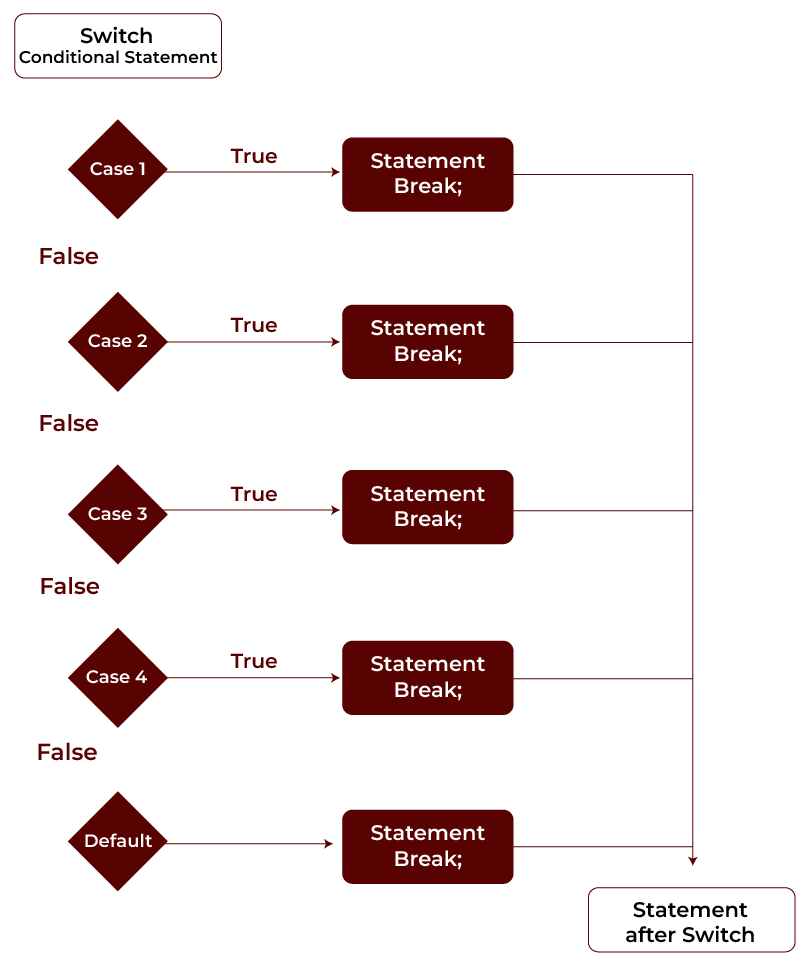
- The expression is evaluated once, and its value is compared against each case.
- If a match is found, the code block for that case is executed.
- The break statement is used to exit the switch after executing the matching case.
- The default case is optional and runs if no match is found.
Also Read: Difference between Break and Continue Statement in C
6. Ternary Operator for Short Conditional Logic
The ternary operator is shorthand for an if-else statement. It is helpful when the condition is relatively simple and returns some value based on that condition.
- If condition is true, expression1 is executed.
- If condition is false, expression2 is executed.
- This operator is ideal for simple, two-way decisions where a full if-else would be overkill.
Jump Statements for Unconditional Control of Loop Flow
We have loops, but sometimes we need to get out of a loop earlier, skip over part of the loop or jump to another place in the program. That’s what jump statements do.
Jump statements give additional unconditional control over the execution of our code in C programming. These are break, continue, goto and return. Let’s briefly review each one.
Use Break to Exit Loops or Switches
Sometimes we want to exit a loop or a switch early. We can do just this with the break statement. Often we use it once we have what we are seeking and we don’t want to continue looping inside of the loop.

Example: Breaking Out of a Loop
Here, the loop prints numbers from 1 to 4 and stops when i reaches 5. The break statement immediately exits the loop.
Also Read: Switch Statement in C
Example: Breaking in a Switch Statement
In the switch statement, once case 3 is executed, the break ensures no other cases are run.
Understanding Continue to Skip Current Loop Iterations
The key difference between continue and break is that in using continue, we are not leaving the loop. What happens is that the continue skips what is left inside the iteration of the present loop and moves to the next one.
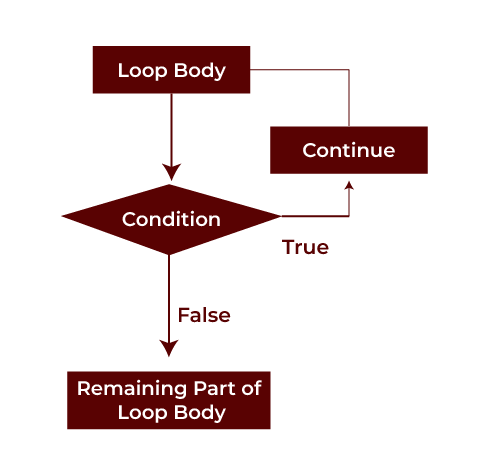
Example: Skipping Even Numbers in a Loop
In this loop, whenever i is even, the continue statement skips the printf line and jumps to the next iteration, printing only the odd numbers.
Employing goto for Unconditional Code Jumps
The goto statement lets us jump ahead to where we have a named label in the code. Powerful, but rather not suggested; the code becomes that much harder to read.
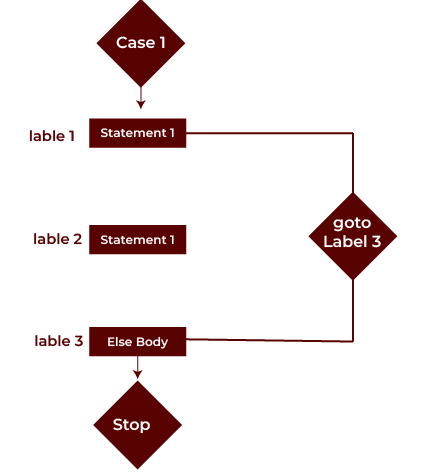
Example: Using goto to Skip Part of the Code
Here, the program jumps directly to the skip label, skipping the part where the first printf would have executed.
Also Read: goto Statement in C
Utilising Return to Exit Functions and Return Values
The return statement exits a function and returns control to the place where the function is called. Plus, we can use return to pass back a value to the caller.
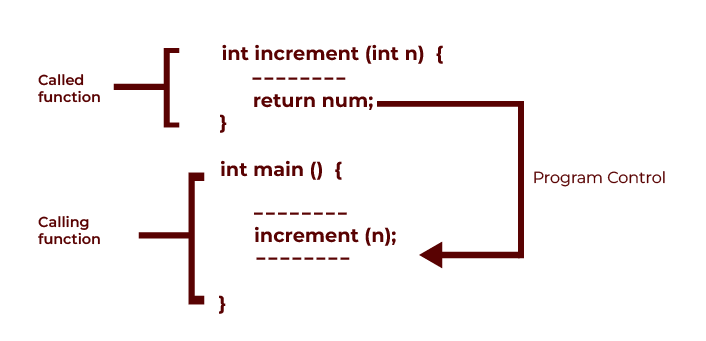
Example: Using return to Exit a Function Early
In this case, the function exits early and returns 0 because the input number is negative.
Also Read: Ternary Operator in C

Code Examples for Conditional Statements in C
Example for if statement: check if a number is positive.
Example for if-else: Determine Even or Odd Number
Example for Nested if-else: Determine the Largest of Three Numbers
Example for else-if ladder: assign grades based on marks, example for switch: determine the day of the week, example for ternary operator: condensed conditional logic.
Also Read: C Programming Interview Questions and Answers
Knowing how to apply conditional statements in C properly means you can create dynamic and efficient programs. These enable us to control the flow of a program, make decisions, and handle complex logic in a clean manner. Some ways we can ensure that our code remains readable and efficient, avoid deep nesting, use switch for multiple conditions, and minimise redundant checks.
Mastering conditional statements in C makes you a smarter programmer since your code will be able to be written much better. But the good part is that such code can be understood and maintained quite easily. This is an important lesson for every C programmer.
If you wish to learn more and develop your skills, you can enrol in the Certificate Program in Full Stack Development with Specialization for Web and Mobile from Hero Vired. This course takes it from front-end development to back-end development, allowing you to master skills, not just in Web but also in Mobile technologies.
Deploying Applications Over the Cloud Using Jenkins

Prashant Kumar Dey
Associate Program Director - Hero Vired
Ex BMW | Google
24 October, 7:00 PM (IST)
Limited Seats Left
Book a Free Live Class
Programs tailored for your success

3 ASSURED INTERVIEWS
Part-time · 10 months
Apply by : 26 October, 2024
Download Brochure

Part-time · 7 months

INTERNSHIP ASSURANCE
Part-time · 7.5 months

Part-time · 6 months
Upskill with expert articles
Accelerator Program in Business Analytics & Data Science
Integrated Program in Data Science, AI and ML
Accelerator Program in AI and Machine Learning
Advanced Certification Program in Data Science & Analytics
Certificate Program in Full Stack Development with Specialization for Web and Mobile
Certificate Program in DevOps and Cloud Engineering
Certificate Program in Application Development
Certificate Program in Cybersecurity Essentials & Risk Assessment
Integrated Program in Finance and Financial Technologies
Certificate Program in Financial Analysis, Valuation and Risk Management
Certificate Program in Strategic Management and Business Essentials
Executive Program in Product Management
Certificate Program in Product Management
Certificate Program in Technology-enabled Sales
Certificate Program in Gaming & Esports
Certificate Program in Extended Reality (VR+AR)
Professional Diploma in UX Design
© 2024 Hero Vired. All rights reserved
- Trending Now
- Foundational Courses
- Data Science
- Practice Problem
- Machine Learning
- System Design
- DevOps Tutorial
Conditional Statements in Programming | Definition, Types, Best Practices
Conditional statements in programming are used to control the flow of a program based on certain conditions. These statements allow the execution of different code blocks depending on whether a specified condition evaluates to true or false, providing a fundamental mechanism for decision-making in algorithms. In this article, we will learn about the basics of Conditional Statements along with their different types.
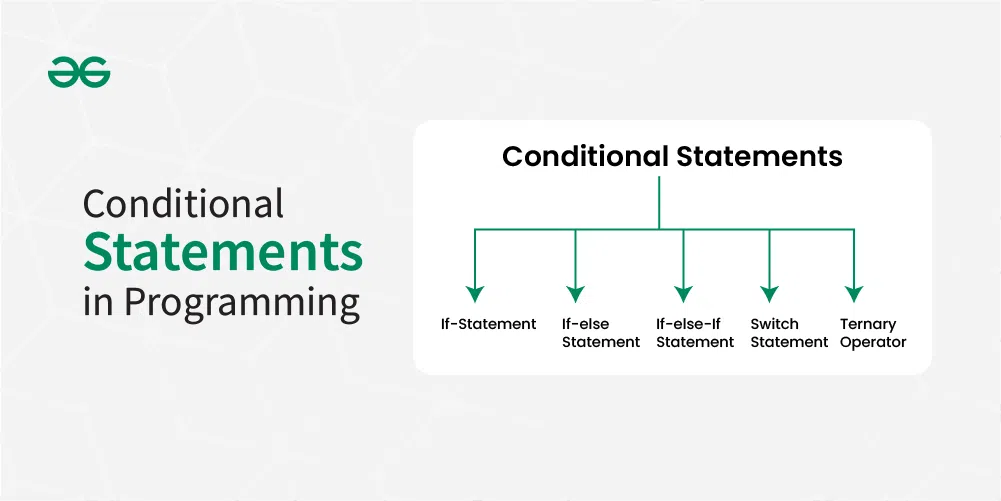
Table of Content
What are Conditional Statements in Programming?
- 5 Types of Conditional Statements
1. If Conditional Statement:
2. if-else conditional statement:, 3. if-else if conditional statement:, 4. switch conditional statement:, 5. ternary expression conditional statement:, difference between types of conditional statements in programming:.
- Difference between If Else and Switch Case
- Best Practices for Conditional Statement
- Frequently Asked Questions FAQs in Conditional Statements
Conditional statements in Programming, also known as decision-making statements, allow a program to perform different actions based on whether a certain condition is true or false. They form the backbone of most programming languages, enabling the creation of complex, dynamic programs.
5 Types of Conditional Statements in Programming
Conditional statements in programming allow the execution of different pieces of code based on whether certain conditions are true or false. Here are five common types of conditional statements:
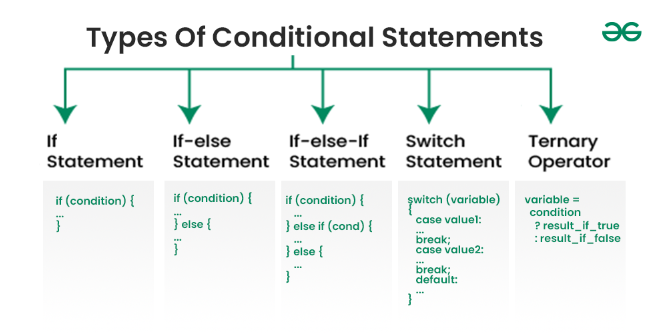
The if statement is the most basic form of conditional statement. It checks if a condition is true. If it is, the program executes a block of code.
Syntax of If Conditional Statement:
if condition is true, the if code block executes. If false, the execution moves to the next block to check.

Use Cases of If Conditional Statement:
- Checking a single condition and executing code based on its result.
- Performing actions based on user input.
Applications of If Conditional Statement:
- Validating user inputs.
- Basic decision-making in algorithms.
Advantages of If Conditional Statement:
- Simple and straightforward.
- Useful for handling basic decision logic.
Disadvantages of If Conditional Statement:
- Limited to checking only one condition at a time.
- Not suitable for complex decision-making.
Implementation of If Conditional Statement:
The if-else statement extends the if statement by adding an else clause. If the condition is false, the program executes the code in the else block.
Syntax of If-Else Conditional Statement:
if condition is true, the if code block executes. If false, the execution moves to the else block.
Use Cases of If-Else Conditional Statement:
- Executing one block of code if a condition is true and another block if it's false.
- Handling binary decisions.
Applications of If-Else Conditional Statement:
- Error handling: For example, displaying an error message if user input is invalid.
- Program flow control: Directing program execution based on conditions.
Advantages of If-Else Conditional Statement:
- Handles binary decisions efficiently.
- Clear and concise syntax.
Disadvantages of If-Else Conditional Statement:
- Limited to binary decisions.
- May become verbose in complex scenarios.
Implementation of If-Else Conditional Statement:
The if-else if statement allows for multiple conditions to be checked in sequence. If the if condition is false, the program checks the next else if condition, and so on.
Syntax of If-Else if Conditional Statement:
In else if statements, the conditions are checked from the top-down, if the first block returns true, the second and the third blocks will not be checked, but if the first if block returns false, the second block will be checked. This checking continues until a block returns a true outcome.
Use Cases of If-Elif-Else Conditional Statement:
- Handling multiple conditions sequentially.
- Implementing multi-way decision logic.
Applications of If-Elif-Else Conditional Statement:
- Implementing menu selection logic.
- Categorizing data based on multiple criteria.
Advantages of If-Elif-Else Conditional Statement:
- Allows handling multiple conditions in a structured manner.
- Reduces the need for nested if-else statements.
Disadvantages of If-Elif-Else Conditional Statement:
- Can become lengthy and harder to maintain with many conditions.
- The order of conditions matters; incorrect ordering can lead to unexpected behavior.
If-Else if Conditional Statement Implementation:
The switch statement is used when you need to check a variable against a series of values. It’s often used as a more readable alternative to a long if-else if chain.
In switch expressions, each block is terminated by a break keyword. The statements in switch are expressed with cases.
Switch Conditional Statement Syntax:
Use Cases of Switch Statement:
- Selecting one of many code blocks to execute based on the value of a variable.
- Handling multiple cases efficiently.
Applications of Switch Statement:
- Processing user choices in a menu.
- Implementing state machines.
Advantages of Switch Statement:
- Provides a clean and efficient way to handle multiple cases.
- Improves code readability when dealing with many conditions.
Disadvantages of Switch Statement:
- Limited to equality comparisons, cannot use range checks or complex conditions.
- Lack of fall-through control can lead to unintentional bugs if not used carefully.
Switch Conditional Statement Implementation:
The ternary operator is a shorthand way of writing an if-else statement. It takes three operands: a condition, a result for when the condition is true, and a result for when the condition is false.
Syntax of Ternary Expression:
Use cases of ternary expression:.
- Concise conditional assignment.
- Inline conditional assignment.
Applications of Ternary Expression:
- Assigning values based on conditions in functional programming.
- Inline conditional assignment in single lines of code.
Advantages of Ternary Expression:
- Concise syntax, reducing the need for multiple lines of code.
- Suitable for simple conditional assignments.
Disadvantages of Ternary Expression:
- Can reduce code readability, especially for complex conditions or expressions.
- Limited to simple assignments; not suitable for complex branching logic.
Implementation of Ternary Expression:
Difference between if else and switch case:, best practices for conditional statements in programming:.
- Keep it simple: Avoid complex conditions that are hard to understand. Break them down into simpler parts if necessary.
- Use meaningful names: Your variable and function names should make it clear what conditions you’re checking.
- Avoid deep nesting: Deeply nested conditional statements can be hard to read and understand. Consider using early returns or breaking your code into smaller functions.
- Comment your code: Explain what your conditions are checking and why. This can be especially helpful for complex conditions.
In conclusion, Conditional statements are a fundamental part of programming, allowing for dynamic and interactive programs. By understanding and using them effectively, you can create programs that are more efficient, readable, and maintainable.
Conditional Statements in Programming | Definition, Types, Best Practices - FAQs
What are the 5 conditional statements.
In programming, the term "conditional statements" typically refers to constructs used to perform different actions based on whether a certain condition evaluates to true or false. The most common conditional statements are: If statement : Executes a block of code if a specified condition is true. If-else statement : Executes one block of code if the specified condition is true and another block of code if the condition is false. If-elif-else statement (or switch statement) : Executes different blocks of code depending on the evaluation of multiple conditions. Ternary operator : A concise way of writing an if-else statement that evaluates a condition and returns one of two values depending on whether the condition is true or false. Nested if statement : An if statement within another if statement, allowing for more complex conditional logic.
What are conditional statements in computer?
Conditional statements in computer programming are constructs that allow the execution of different sequences of code based on whether certain conditions are true or false. They enable programs to make decisions and choose different paths of execution dynamically. Conditional statements are crucial for controlling the flow of a program and implementing logic that responds to varying inputs or situations.
Why conditional statements?
Conditional statements are essential in programming for several reasons: Decision Making : Conditional statements allow programs to make decisions based on various conditions or inputs. They enable programs to choose different actions or paths of execution depending on the situation, making programs more flexible and adaptable. Control Flow : Conditional statements control the flow of execution within a program. They determine which parts of the code are executed and in what order, enabling programmers to create algorithms that respond to changing conditions or user interactions. Dynamic Behavior : Conditional statements enable programs to exhibit dynamic behavior by adjusting their actions based on real-time inputs or external factors. This dynamic behavior is crucial for creating interactive applications, games, and simulations. Error Handling : Conditional statements are often used for error handling and exception handling. Programs can use conditions to detect errors or exceptional situations and respond appropriately, such as by displaying error messages, logging errors, or taking corrective actions. Customization and Personalization : Conditional statements allow programs to customize their behavior based on specific criteria or user preferences. This customization enables the creation of personalized experiences in applications, websites, and other software products. Efficiency : Conditional statements help optimize program performance by avoiding unnecessary computations or operations. By selectively executing code based on conditions, programs can conserve resources and improve efficiency.
What is conditional statements in C?
In C programming, conditional statements are used to control the flow of execution based on certain conditions. There are three primary types of conditional statements in C: if statement : The if statement allows you to execute a block of code if a specified condition evaluates to true. if-else statement : The if-else statement allows you to execute one block of code if a condition is true and another block of code if the condition is false. if-else if-else statement : The if-else if-else statement allows you to evaluate multiple conditions sequentially and execute different blocks of code based on the first condition that evaluates to true. Ternary conditional operator
What are the conditional expressions in Python?
In Python, conditional expressions are constructs that allow you to execute different code based on whether a certain condition is true or false. The primary conditional expressions in Python include: if statement : The if statement allows you to execute a block of code if a specified condition evaluates to true. if-else statement : The if-else statement allows you to execute one block of code if a condition is true and another block of code if the condition is false. if-elif-else statement : The if-elif-else statement allows you to evaluate multiple conditions sequentially and execute different blocks of code based on the first condition that evaluates to true. Ternary conditional operator : Python also supports a ternary conditional operator ( expression if condition else expression ) which provides a concise way to write simple if-else statements.
What are the 4 conditional statements in Java?
In Java, like many other programming languages, you typically have four main types of conditional statements: if Statement : The if statement allows you to execute a block of code if a specified condition is true. if-else Statement : The if-else statement allows you to execute one block of code if a condition is true and another block of code if the condition is false. if-else if-else Statement : The if-else if-else statement allows you to evaluate multiple conditions sequentially and execute different blocks of code based on the first condition that evaluates to true. Switch Statement : The switch statement allows you to select one of many code blocks to be executed based on the value of a variable.
Similar Reads
- Programming
Please Login to comment...
Improve your coding skills with practice.
What kind of Experience do you want to share?
C Functions
C structures, c reference, c operators.
Operators are used to perform operations on variables and values.
In the example below, we use the + operator to add together two values:
Although the + operator is often used to add together two values, like in the example above, it can also be used to add together a variable and a value, or a variable and another variable:
C divides the operators into the following groups:
- Arithmetic operators
- Assignment operators
- Comparison operators
- Logical operators
- Bitwise operators
Arithmetic Operators
Arithmetic operators are used to perform common mathematical operations.
Assignment Operators
Assignment operators are used to assign values to variables.
In the example below, we use the assignment operator ( = ) to assign the value 10 to a variable called x :
The addition assignment operator ( += ) adds a value to a variable:
A list of all assignment operators:
Advertisement
Comparison Operators
Comparison operators are used to compare two values (or variables). This is important in programming, because it helps us to find answers and make decisions.
The return value of a comparison is either 1 or 0 , which means true ( 1 ) or false ( 0 ). These values are known as Boolean values , and you will learn more about them in the Booleans and If..Else chapter.
Comparison operators are used to compare two values.
Note: The return value of a comparison is either true ( 1 ) or false ( 0 ).
In the following example, we use the greater than operator ( > ) to find out if 5 is greater than 3:
A list of all comparison operators:
Logical Operators
You can also test for true or false values with logical operators.
Logical operators are used to determine the logic between variables or values, by combining multiple conditions:
C Exercises
Test yourself with exercises.
Fill in the blanks to multiply 10 with 5 , and print the result:
Start the Exercise

COLOR PICKER

Contact Sales
If you want to use W3Schools services as an educational institution, team or enterprise, send us an e-mail: [email protected]
Report Error
If you want to report an error, or if you want to make a suggestion, send us an e-mail: [email protected]
Top Tutorials
Top references, top examples, get certified.
cppreference.com
Assignment operators.
Assignment and compound assignment operators are binary operators that modify the variable to their left using the value to their right.
[ edit ] Simple assignment
The simple assignment operator expressions have the form
Assignment performs implicit conversion from the value of rhs to the type of lhs and then replaces the value in the object designated by lhs with the converted value of rhs .
Assignment also returns the same value as what was stored in lhs (so that expressions such as a = b = c are possible). The value category of the assignment operator is non-lvalue (so that expressions such as ( a = b ) = c are invalid).
rhs and lhs must satisfy one of the following:
- both lhs and rhs have compatible struct or union type, or..
- rhs must be implicitly convertible to lhs , which implies
- both lhs and rhs have arithmetic types , in which case lhs may be volatile -qualified or atomic (since C11)
- both lhs and rhs have pointer to compatible (ignoring qualifiers) types, or one of the pointers is a pointer to void, and the conversion would not add qualifiers to the pointed-to type. lhs may be volatile or restrict (since C99) -qualified or atomic (since C11) .
- lhs is a (possibly qualified or atomic (since C11) ) pointer and rhs is a null pointer constant such as NULL or a nullptr_t value (since C23)
[ edit ] Notes
If rhs and lhs overlap in memory (e.g. they are members of the same union), the behavior is undefined unless the overlap is exact and the types are compatible .
Although arrays are not assignable, an array wrapped in a struct is assignable to another object of the same (or compatible) struct type.
The side effect of updating lhs is sequenced after the value computations, but not the side effects of lhs and rhs themselves and the evaluations of the operands are, as usual, unsequenced relative to each other (so the expressions such as i = ++ i ; are undefined)
Assignment strips extra range and precision from floating-point expressions (see FLT_EVAL_METHOD ).
In C++, assignment operators are lvalue expressions, not so in C.
[ edit ] Compound assignment
The compound assignment operator expressions have the form
The expression lhs @= rhs is exactly the same as lhs = lhs @ ( rhs ) , except that lhs is evaluated only once.
[ edit ] References
- C17 standard (ISO/IEC 9899:2018):
- 6.5.16 Assignment operators (p: 72-73)
- C11 standard (ISO/IEC 9899:2011):
- 6.5.16 Assignment operators (p: 101-104)
- C99 standard (ISO/IEC 9899:1999):
- 6.5.16 Assignment operators (p: 91-93)
- C89/C90 standard (ISO/IEC 9899:1990):
- 3.3.16 Assignment operators
[ edit ] See Also
Operator precedence
[ edit ] See also
- Recent changes
- Offline version
- What links here
- Related changes
- Upload file
- Special pages
- Printable version
- Permanent link
- Page information
- In other languages
- This page was last modified on 19 August 2022, at 09:36.
- Privacy policy
- About cppreference.com
- Disclaimers
PrepBytes Blog
ONE-STOP RESOURCE FOR EVERYTHING RELATED TO CODING
Sign in to your account
Forgot your password?
Login via OTP
We will send you an one time password on your mobile number
An OTP has been sent to your mobile number please verify it below
Register with PrepBytes
Conditional statements in c.
Last Updated on April 17, 2023 by Prepbytes

Conditional statements in C are programming constructs that allow a program to execute different blocks of code based on whether a certain condition is true or false. The most common types of conditional statements in C are the if, else if, and else statements.
- What is a Conditional Statement In C?
Conditional statement in C programming are used to base choices on the conditions. When there is no condition surrounding the statements, conditional statement in C are executed sequentially. The execution flow may alter if a condition is added to a block of statements depending on the outcome of the condition’s evaluation. In "C", this procedure is known as decision-making.
Conditional statement in C are possible with the use of the following two structures:
If statement
- If-else statement
As a program chooses which statement to execute based on the outcome of the evaluated condition, it is also known as branching.
In this tutorial, you will learn-
- If Statement
Relational Operators
- The If-Else Statement
Conditional Expressions
Nested if-else statements.
- Nested Else-if Statements
One of the effective conditional statement in C is this one. The if statement is in charge of changing how a program executes. A condition is always used with an if statement. Any statement inside the body of if is first evaluated against the condition. The following is the syntax for an if statement:
The result of the condition is either true or false. False is a value that contains zero, and true is always a value that is not zero. A code block surrounded by curly braces { } or a single instruction can both be used as instructions.
Steps for if conditional statement in C The if construct is used to examine the equality of two numbers in the program above.
- In the above program, we have initialized two variables with num1, num2 with value as 1, 2 respectively.
- Then, to determine which number is the smallest and which is the largest, we will use if with a test-expression. In the if construct, we used a relational expression. The condition will evaluate to true because the value of num1 is less than the value of num2.
- Thus, the statement contained within the If block will be printed. The control will then leave the block at that point, and the program will end successfully.
For decision-making and condition testing, C contains six relational operators that can be used to create Boolean expressions that return true or false:
- < less than
- <= less than or equal to
greater than
= greater than or equal to
- == equal to
- != not equal to
One of the most common concerns a programmer gets into when mixing up the assignment operator (=) and the equal test (==) but actually they are distinct..
For example
Remember that a condition is considered to be true if it evaluates to a non-zero value.
The If-Else statement

The if-else statement is a developed form of the if statement. The following is the if-else general form:
If the test-expression value is true in this type of construct, then the true block of statements will be performed. The false block of statements will be executed if the test-value expression is false. Regardless, upon execution, control will be immediately passed to the statements outside the If block.
Following programs illustrate the use of the if-else construct:
In order to determine whether a value is less than or greater than ten, we will create a variable with a value and write a program.
Steps to use if-else conditional statement in C
- A variable has been initialized with the value 19. Using a "C" program, we must determine whether the number is greater than or less than 10. We have used the if-else construct to accomplish this.
- Because we need to compare this value to 10, we have added the condition num< 10.
- As you can see, the first block is always a true block, meaning it will be performed if the test-value expression is true.
- An else block makes up the second block. The statements in this block are the ones that will be carried out if the test-value expression is changed to false. Because num in our program is more than ten, the test-condition is false, and the else block is then run. As a result, the else block’s output will be "The value is more than 10." After the if-else statement, the program will end successfully.
Nesting of if-else statements is the technique of using multiple if-else constructs inside of one another in "C" programming.
The ? operator can also be used to create an if-else expression. The ? is used in a conditional expression. There is only one statement connected to the if and else in the operator.
Nested if-else is used when a sequence of decisions is necessary. Utilizing one if-else construct inside another is known as nesting.
Let’s write a program to illustrate the use of nested if-else.
The program mentioned above uses a nested if-else construct to verify whether a value is less than or larger than 10 and prints the result.
Steps for Nested If-else conditional statement in C
- Firstly, we have declared a variable num with value as 1. Then we have used the if-else construct.
- In the outer if-else, the condition provided checks if a number is less than 10. If the condition is true then and only then it will execute the inner loop. In this case, the condition is true hence the inner block is processed.
- A condition that determines whether or not our variable holds the value 1 is present once more in the inner block. If a condition is satisfied, the If block will be executed; otherwise, the else block will be executed. Since the condition is satisfied in this instance, the If statement is run, and the value is displayed on the output screen.
- The aforementioned program will successfully exit after printing the value of a variable.
Try altering a variable’s value to observe how the program behaves.
NOTE: Because several if-else constructs are used in nested if-else, it can be challenging to identify separate constructs, thus we must be careful with the indentation. The program is easier to read when properly indented.
Nested Else-if statements
When multipath decisions are necessary, nested else-if is used. The following is a broad description of how else-if ladders are built in "C" programming:
The else-if ladder is a particular form of structure. This chain is known as an else-if ladder as it typically has a ladder-like appearance. The test expressions are evaluated in reverse order. A statement linked to a true test expression is performed when it is discovered. The default else statement is run whenever all n test-expressions have been evaluated as false.
Let us see the actual working with the help of a program.
The program mentioned above prints the grade based on the test results. In the program mentioned above, we used the else-if ladder construct.
Steps for else-if conditional statement in C
- A variable has been initialized with marks. Our else-if ladder structure includes a number of conditions.
- When the first condition is met, the value from the variable marks will be compared with it, and if it is, the statement linked to it will be written on the output screen.
- If the first test condition proves to be untrue, the second test condition is then evaluated.
- Until all expressions are evaluated, this procedure will continue. If not, control will exit the else-if ladder, and the default statement will be written.
Try changing the value and observe how the output changes.
Conclusion In this article, we had discussed completely about the conditional statement in C. Depending on the outcome of the evaluated expression, one path is chosen using decision-making or branching statements. Because it manages how a program is executed, it is also known as a control statement. If, if-else constructions are available in "C" for use in decision-making statements. When several pathways need to be evaluated, we can also stack if-else within one another. When we need to verify several ways dependent on the expression’s result, we use the else-if ladder.
Frequently Asked Questions(FAQs)
Q1. What is the syntax for an if conditional statement in C? Ans: The syntax for an if conditional statement in C is:
Q2. What is the syntax for an else if conditional statement in C? Ans: The syntax for an else if conditional statement in C is:
Q3. What is the syntax for an else conditional statement in C? Ans: The syntax for an else conditional statement in C is:
Q4. Can I use multiple else if statements in a row in C? Ans: Yes, you can use multiple else if statements in a row in C to check multiple conditions in a sequence.
Q5. How do I use logical operators (&&, ||, !) with conditional statements in C? Ans: Logical operators can be used to combine multiple conditions in a single if statement or to negate a condition.
For example:
Leave a Reply Cancel reply
Your email address will not be published. Required fields are marked *
Save my name, email, and website in this browser for the next time I comment.
- Linked List
- Segment Tree
- Backtracking
- Dynamic Programming
- Greedy Algorithm
- Operating System
- Company Placement
- Interview Tips
- General Interview Questions
- Data Structure
- Other Topics
- Computational Geometry
- Game Theory
Related Post
Null character in c, assignment operator in c, ackermann function in c, median of two sorted arrays of different size in c, number is palindrome or not in c, implementation of queue using linked list in c.

IMAGES
VIDEO
COMMENTS
The conditional operator in C is kind of similar to the if-else statement as it follows the same algorithm as of if-else statement but the conditional operator takes less space and helps to write the if-else statements in the shortest way possible. It is also known as the ternary operator in C as it operates on three operands.. Syntax of Conditional/Ternary Operator in C
The conditional operator in C is a conditional statement that returns the first value if the condition is true and returns another value if the condition is false. It is similar to the if-else statement. The if-else statement takes more than one line of the statements, but the conditional operator finishes the same task in a single statement.
What is the need for the conditional operator? Functionally it is redundant, since it implements an if-else construct. If the conditional operator is more efficient than the equivalent if-else assignment, why can't if-else be interpreted more efficiently by the compiler?
Example: C Ternary Operator. Output 1. In the above example, we have used a ternary operator that checks whether a user can vote or not based on the input value. Here, Here, the user inputs 12, so the condition becomes false. Hence, we get You cannot vote as output. Output 2.
Next: Comma Operator, Previous: Logicals and Assignments, Up: Execution Control Expressions [Contents] [Index] 8.4 Conditional Expression. C has a conditional expression that selects one of two expressions to compute and get the value from. It looks like this: condition ? iftrue : iffalse. • Conditional Rules. Rules for the conditional operator.
1. "=": This is the simplest assignment operator. This operator is used to assign the value on the right to the variable on the left. Example: a = 10; b = 20; ch = 'y'; 2. "+=": This operator is combination of '+' and '=' operators.This operator first adds the current value of the variable on left to the value on the right and then assigns the result to the variable on the left.
Operators are symbols used for performing some kind of operation in C. There are six types of operators, Arithmetic Operators, Relational Operators, Logical Operators, Bitwise Operators, Assignment Operators, and Miscellaneous Operators. Operators can also be of type unary, binary, and ternary according to the number of operators they are using.
Output: 5 is Odd. Explanation: The conditional operator checks if num % 2 == 0 (whether the number is even). Since 5 is not divisible by 2, the string "Odd" is assigned to result. Example 3: Simplifying Multiple Conditional assignments. Nested conditional operators allow checking for multiple conditions concisely. Code:
2. Write a C program to check whether a given number is even or odd. Test Data : 15 Expected Output : 15 is an odd integer Click me to see the solution. 3. Write a C program to check whether a given number is positive or negative. Test Data : 15 Expected Output : 15 is a positive number Click me to see the solution. 4.
The conditional operator in C, often referred to as the ternary operator, offers a streamlined way to execute if-else statements in just one line. This powerful tool allows programmers to evaluate a condition and choose between two paths: one if the condition is true, and another if it's false. Its simplicity and efficiency make it a favorite ...
The reason is: Performance improvement (sometimes) Less code (always) Take an example: There is a method someMethod() and in an if condition you want to check whether the return value of the method is null. If not, you are going to use the return value again. If(null != someMethod()){. String s = someMethod();
Simple assignment operator. Assigns values from right side operands to left side operand. C = A + B will assign the value of A + B to C. +=. Add AND assignment operator. It adds the right operand to the left operand and assign the result to the left operand. C += A is equivalent to C = C + A. -=.
Conditional statements in C are used to perform different actions depending on whether a condition evaluates to true or false. Conditions are mainly comparisons or expressions that evaluate a Boolean result, that is, a true or false value. If this condition evaluates to true, the program runs a particular block of code.
Concise conditional assignment. Inline conditional assignment. Applications of Ternary Expression: Assigning values based on conditions in functional programming. Inline conditional assignment in single lines of code. Advantages of Ternary Expression: Concise syntax, reducing the need for multiple lines of code.
Comparison operators are used to compare two values (or variables). This is important in programming, because it helps us to find answers and make decisions. The return value of a comparison is either 1 or 0, which means true (1) or false (0). These values are known as Boolean values, and you will learn more about them in the Booleans and If ...
Assignment performs implicit conversion from the value of rhs to the type of lhs and then replaces the value in the object designated by lhs with the converted value of rhs. Assignment also returns the same value as what was stored in lhs (so that expressions such as a = b = c are possible). The value category of the assignment operator is non ...
Basically C evaluates expressions. In. s = data[q] The value of data[q] is the the value of expression here and the condition is evaluated based on that. The assignment. s <- data[q] is just a side-effect.
Conditional statement in C programming are used to base choices on the conditions. When there is no condition surrounding the statements, conditional statement in C are executed sequentially. The execution flow may alter if a condition is added to a block of statements depending on the outcome of the condition's evaluation.
Experience-based Joint Duty Assignment (E-JDA) Review Board. Manpower Management Officer Assignments, Joint Officer Matters Office (JOMO) will function as the service lead in order to process